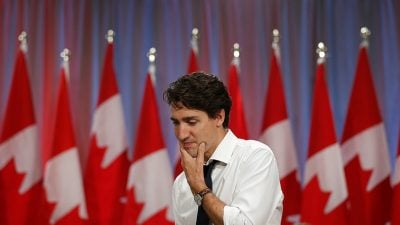Trudeau’s Vacuous Haiti Declaration Ignores Revolution, Slavery

Justin Trudeau likes making high-minded sounding statements that make him seem progressive but change little. The Prime Minister’s declaration marking “Haiti’s Independence Day” was an attempt of the sort, which actually demonstrates incredible ignorance, even antipathy, towards the struggle against slavery.
In his statement commemorating 215 years of Haitian Independence, the Prime Minister failed to mention slavery, Haiti’s revolution and how that country was born of maybe the greatest example of liberation in the history of humanity. From the grips of the most barbaric form of plantation economy, the largely African-born slaves delivered a massive blow to slavery, colonialism and white supremacy.
Before the 1791 revolt the French colony of Saint Domingue was home to 450,000 people in bondage. At its peak in the 1750s the ‘Pearl of the Antilles’ provided as much as 50 per cent of France’s GNP. Super profits were made from using African slaves to produce sugar, cocoa, coffee, cotton, tobacco, indigo and other commodities.
The slaves put a stop to that with a merciless struggle that took advantage of divisions between ‘big white’ land/slave owners, racially empowered though poorer ‘small whites’ and a substantial ‘mulatto’ land/slave owning class. The revolt rippled through the region and compelled the post-French Revolution government in Paris to abolish slavery in its Caribbean colonies. Between 1791 and 1804 ‘Haitians’ would defeat tens of thousands of French, British and Spanish troops (Washington backed France financially), leading to the world’s first and only successful large-scale slave revolution. The first nation of free people in the Americas, Haiti established a slave-free state 60 years before the USA’s emancipation proclamation. (It wasn’t until after this proclamation ending slavery that the US recognized Haiti’s independence.)
The Haitian Revolution’s geopolitical effects were immense. It stimulated the Louisiana Purchase and London’s 1807 Act for the Abolition of the Slave Trade. The revolutionary state also provided important support to South American independence movements.
Canada’s rulers at the time opposed the slave revolt. In a bid to crush the ex-slaves before their example spread to the English colonies, British forces invaded Haiti in 1793. Halifax, which housed Britain’s primary naval base in North America, played its part in London’s efforts to capture one of the world’s richest colonies (for the slave owners). Much of the Halifax-based squadron arrived on the shores of the West Indies in 1793, and many of the ships that set sail to the Caribbean at this time were assembled in the town’s naval yard. Additionally, a dozen Nova Scotia privateers captured at least 57 enemy vessels in the West Indies between 1793 and 1805. “Essential tools of war until the rise of large steam navies”, the privateers also wanted to protect the British Atlantic colonies’ lucrative Caribbean market decimated by French privateers. For a half-century Nova Scotia and Newfoundland generated great wealth selling cheap, high-protein cod to keep millions of “enslaved people working 16 hours a day”.
A number of prominent Canadian-born (or based) individuals fought to capture and re-establish slavery in the French colonies. Dubbed the “Father of the Canadian Crown”, Prince Edward Duke of Kent departed for the West Indies aboard a Halifax gunboat in 1793. As a Major General, he led forces that captured Guadalupe, St. Lucia and Martinique. Today, many streets and monuments across the country honour a man understood to have first applied the term “Canadian” to both the English and French inhabitants of Upper and Lower Canada.
Other “Canadians” played a part in Britain’s effort to corner the lucrative Caribbean slave plantations. Born into a prominent Québec military family, Charles Michel Salaberry “was part of successful invasions of Saint-Dominique [Haiti], Guadeloupe and Martinique.” A number of monuments commemorate Salaberry, including the city in Québec named Salaberry-de-Valleyfield.
To commemorate Haitian independence the Secretary General of the Caribbean Community, Irwin LaRocque, also released a statement. Unlike Trudeau, LaRocque “congratulated” Haiti and described the day as “a timely reminder of the historic importance of the Haitian Revolution and its continued significance as a symbol of triumph over adversity in the quest for liberty, equality and control of national destiny.”
Trudeau should have said something similar and acknowledged Canadians’ role in the slave trade and crimes against the free people of Haiti.
*
Note to readers: please click the share buttons above. Forward this article to your email lists. Crosspost on your blog site, internet forums. etc.

